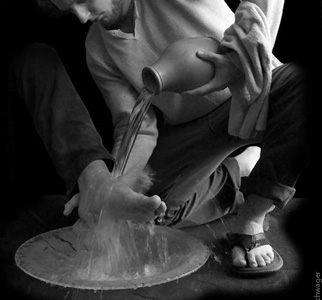January 2012 - Vol. 56  A Servant's Heart – Loving and Serving Others for their Sake .. By Don Schwager The nature of
Christ’s love for others
Jesus not only demonstrated his great love for us, he made it a new commandment as well – “love one another as I have loved you” (John 15:12). Jesus’ love was first and foremost very direct and personal. He never treated people impersonally or at a distance. Jesus often made it a point to stop what he was doing and to ask people what he could do for them. When a blind man, named Bartimaeus, shouted for Jesus’ attention, Jesus immediately stopped what he was doing and asked Bartimaeus “What do you want me to do for you?” Then Jesus immediately granted his request and restored his sight (Mark 10:46-52). When Jairus, a ruler of the synagogue, asked Jesus to heal his dying daughter, Jesus immediately went to the ruler’s home and asked to see the child on her sick bed. “Taking her by the hand, he said to her, ‘Little girl, I say to you, arise’” (Mark 5:41). When Jesus saw Zacchaeus, the tax collector, watching him from a distance in a tree, Jesus stopped what he was doing and began to speak with Zacchaeus alone. “Make haste and come down. I must stay at your house today!” (Luke 19:5-6. Jesus’ gracious invitation was not only an act of special favor and friendship, but a remarkable reversal of the scorn and distance usually shown to tax collectors at the time.
When the apostles tried to keep children away from Jesus, Jesus rebuked them and said, “Do not hinder the children from coming to me… then he took them in his arms and blessed them, laying his hands upon them” (Mark 10:13-16). When Jesus went to Peter’s home, he discovered that Peter’s mother-in-law had a fever. So Jesus “came and took her by the land and lifted her up, and the fever left her” (Mark 1:31). Jesus’ compassion was more than a verbal expression of heartfelt sympathy. With his tender physical touch he personally identified with the misfortunes of others and then went on to alleviate their suffering as well. When he met a man who could not speak or hear, he put his fingers into the man’s ears and he touched the man’s tongue with his own spittle – both to physically identify with his ailments and to bring his healing touch (Mark 7:32-35). When lepers approached Jesus he did not keep his distance to avoid contamination. Jesus physically touched them, embracing them with his personal care, and he made them whole and well, both physically and spiritually (Mark 1:40-42). Jesus identified so closely with people’s concerns and burdens, that these became his as well. He wept with those who lost loved ones and he mourned over the city of Jerusalem because many of its inhabitants were unprepared to receive him as their savior. Jesus shared in the joys of people as well – he even changed water into wine for a newly-wed couple when their wedding reception supply ran dry (John 2;1-10). The gospels state over and over again that when Jesus saw the crowds who came to see him “he had compassion for them, because they were harassed and helpless, like sheep without a shepherd” (Matthew 9:36; Matthew 14:14 and 15:32; Mark 6:34). Jesus loved with a servant’s heart – a heart that was always oriented to the needs and interests of others and always ready to do good for them. A holy self-disinterestedness
How can we possibly attain such love – love that is pure, unselfish, wholly directed to the good of others? Paul the Apostle tells us that we already possess it in the gift of the Holy Spirit. Hope does not disappoint us, because God’s love has been poured into our hearts through the Holy Spirit who has been given to us (Romans 5:5).We already have a divine power at work within us – through the gift and working of the Holy Spirit. The Holy Spirit transforms us into the image of Christ. He re-creates us and gives us a new heart, a heart like the heart of Jesus himself. We can now love others as Jesus has loved them because God’s Spirit dwells in us and gives us the strength to lay down our lives in humble service of others. The choice is ours to make each and every day – either to yield to what my flesh wants or to yield to the Holy Spirit who gives me the strength to love as Jesus loves.
Put on Jesus Christ
Do nothing from selfishness or conceit, but in humility count others better than yourselves. Let each of you look not only to his own interests, but also to the interests of others. Have this mind among yourselves, which was in Christ Jesus, who, though he was in for form of God, did not count equality with God a thing to be grasped, but emptied himself, taking the form of a servant, being born in the likeness of men. And being found in human form he humbled himself and became obedient unto death, even death on a cross (Philippians 2:5-8).What might hinder us from loving and serving others for their own sake, rather than for some benefit it might bring to ourselves? We are born with an innate and intense desire to please ourselves and to get others to do our bidding. Selfishness comes quite naturally. It’s part of our fallen sinful nature. Unless this fallen nature is put to death, the new nature which Christ has won for us cannot take root and grow in us. Death to self – especially the self that wants “my will done” in place of God’s will – is the necessary first step for allowing God’s love and truth to take deep root in our hearts. Jesus called his disciples to “deny themselves” – that is to let go of running their lives apart from him (Luke 9:23; Mark 8:34). The Lord Jesus must now reign as the true Master of our lives. If we trust in him and submit to his word, then we can truly know and experience the freedom he has won for us. Jesus promised those who believed in him, “If you continue in my word, you are truly my disciples, and you will know the truth, and the truth will set you free” (John 8:31-32). We are most free when we surrender our lives to the Lord Jesus and allow him to transform our hearts and minds with his love and truth. Letting go of
self-serving interests and selfish ambition
For others, selfish ambition is the driving force that blinds them from serving others with attentive care. Selfish ambition can make us view and treat people as obstacles, interruptions, and problems that stand in the way of getting what we want. Self-centered people are concerned chiefly with themselves and with advancing their own interests to the exclusion of others. They seek to manipulate and use others to get what they want. Preoccupation with self is perhaps the biggest obstacle of all. Our materialist culture caters to putting self first. “You deserve the best! Afterall, you’re first.” We can easily become absorbed in our creaturely comforts and not notice how we might be neglecting others or missing the opportunity to give a helping hand. We’re wired to seek our own pleasure and comfort and to care for ourselves first. And even when we do consciously agree to serve others, we might qualify it with an ulterior motive or reward. “What’s in it for me?” “How will it benefit me or advance my interests?” “I will do a favor for you, but I also expect that you will return the favor as well.” “I will help you out this one time, but don’t expect me to help you when it interferes with my preferences and priorities.” “I will do what is necessary or what is required, but don’t expect me to do more.” It takes effort, discipline, and a healthy dose of self-renunciation to place ourselves last rather than first. Humility, the willingness to change, and the courage to ask God to widen our hearts with generous love, are key steps for growth in Christlike servanthood. Through love be
servants of one another
For you were called to freedom, brethren; only do not use your freedom as an opportunity for the flesh, but through love be servants of one another (Galatians 5:13).With this gift of freedom comes the choice – to serve and advance myself first or to put the interests of others first and to serve them with love. The gift of a servant’s heart – loving and serving others selflessly – involves more than simply giving some of my time and resources to help and care for others. Being a servant of Christ involves taking on the heart of Jesus – a heart that loves to give generously and serve with everything I have. Afterall, everything I possess – my life, gifts, talents, and material goods – come from God. I can use them simply to please myself or share them in serving and caring for others. The Scriptures are full of examples of men and women who loved and served
with generous hearts, and who willingly put the interests of others ahead
of themselves.
Another example, this one from the New Testament, shows how Mary, the mother of the Lord Jesus, looked upon herself as a “maidservant of the Lord” (Luke 1:38,48). When the angel Gabriel greeted her and told her that she would be the mother of the Messiah, she did not hesitate to give her unqualified “yes.” When she heard the news that her cousin Elizabeth was expecting a child, she went in haste to give personal support and practical help (Luke 1:39). Mary stayed with Elizabeth for three months – no short time of personal, probably often menial service (Luke 1:56). To serve is to
reign with Christ
Serving Potiphar: Genesis 39:1-6  Joseph reunited with his brothers in Egypt We do not hear of Joseph wallowing in self-pity, nor evading unpleasant duties. In fact he gave more than what was required or expected of him. He won the admiration and trust of his task masters because he put their interests above himself. He blessed others in the way he served them and cared for their needs, concerns, and interests. Who does that remind you of? The Lord Jesus Christ who came not to be served, but to serve and to give his life as a ransom for many. An early church father once said, “To serve Christ is to reign with him” (see Revelations 5:10). When we submit our lives to the Lord and Master of the universe and allow him to work in and through us, we, too become a blessing to many others. Our joy and privilege is to be servants of Jesus Christ – not just when we offer our prayers or when we perform some act of service. Our privilege is to serve the Lord Jesus Christ in each and every circumstance of our daily lives. Let us do as Paul exhorted his fellow Christians at Colossae: Whatever your task, work heartily, as serving the Lord and not men, knowing that from the Lord you will receive the inheritance as your reward; you are serving the Lord Christ” (Colossians 3:23). Self-serving Interests and Selfish Ambition .
For previous articles in the series, Servants of Jesus Christ, see:
|
. | |||||||||||||||||||||
|
publishing address: Park Royal Business Centre, 9-17 Park Royal Road, Suite 108, London NW10 7LQ, United Kingdom email: living.bulwark@yahoo.com |
. |



